New study published on neurodevelopmental outcomes on prenatal exposure to AEDs
A new study has found that the potential neurodevelopmental impacts associated with the anti-epileptic drug (AED) Topiramate (Topamax) if prescribed during pregnancy may be more significant than previously thought. The study also found increased risks associated with other AEDs when used in combination during pregnancy.

Prenatal exposure to topiramate has been known to increase the risk of congenital malformations, especially with daily doses more than 100mg.
This new study, which was recently published in the medical journal, JAMA neurology, assessed data collected from a patient register in Scandinavian countries Denmark, Finland, Iceland, Norway & Sweden. The data assessed came from the years 1996 – 2017. The researchers found that almost 4.5 million children were born in these countries during this period. 25,000 children had been prenatally exposed to AEDs, of which 16,000 were born to mothers with epilepsy.
Of children of mothers with epilepsy who had not been exposed to epilepsy medications during pregnancy, it was found that Autism Spectrum Disorder (ASD) presented in 1.5% of children born, while Intellectual Disabilities (ID) presented in 0.8% of children born.
For children who were exposed to Topamax monotherapy (i.e., no other AED was used) during pregnancy, ASD presented in 4.3% of cases, while ID presented in 3.1% of cases. As a result, the researchers concluded that
“women of reproductive age who are prescribed topiramate should be informed of the potential risks, and these should be weighed against the benefits and available treatment options”.
The study also looked at several other epilepsy drugs. Sodium Valproate (Epilim) monotherapy resulted in 2.7% and 2.4% of children exposed presenting with ASD and ID respectively. These results have confirmed numerous previous findings.
No increased risks for neurodevelopmental disorders were found to be associated with prenatal exposure to monotherapy with lamotrigine (Lamictal), levetiracetam (Keppra), carbamazepine (Tegretol), oxcarbazepine (Trileptal), gapapentin (Neurontin), pregabalin (Lyrica), clonazepam (Rivotril), or phenobarbital.
Many people take more than one medication for their seizures. When a person is taking two medications, this is known as duotherapy. The study looked at a variety of duotherapy options and found that the following combinations were also associated with increased risks of neurodevelopmental disabilities:
- lamotrigine with valproate
- lamotrigine with topiramate
- levetiracetam with carbamazepine
- lamotrigine with oxcarbazepine
The increased risk of these combinations was found to be in the same range as valproate monotherapy.
Researchers found that the combination of levetiracetam and lamotrigine was not associated with adverse neurodevelopment.
This is the largest study of neurodevelopmental outcomes following prenatal exposure to epilepsy medications and its findings are very significant to all women with epilepsy of childbearing potential.
This research has already led to immediate action from regulatory authorities. The European Medicines Agency’s Pharmacovigilance Risk Assessment Committee (PRAC) met this week to discuss the emergence of this new evidence in relation to Topiramate. In a public statement, the EMA states that “women with epilepsy are advised to avoid becoming pregnant whilst being treated with topiramate, and to consult their doctor for advice in case they wish to become pregnant”.
They add that “In light of the importance of this new information, the PRAC decided that further assessment is warranted to determine the scope and the best regulatory procedure to assess these potential risks”. You can read the statement in full by visiting the European Medicines Agency website.
OACS Ireland will be closely monitoring developments, we and our colleagues in Epilepsy Ireland will be meeting the Irish medicines regulator, the Health Products Regulatory Authority (HPRA), next week on this issue.
We know this information can be distressing for many women with epilepsy who are taking topiramate or the combinations highlighted above and who are pregnant or planning a family. However, it is also vital that all patients are provided with the most accurate and up to date information available. Please contact OACS Ireland should you need support to attend genetics and/or support. Email address: info.oacsireland@gmail.com
If you are a woman with epilepsy who is thinking of starting a family discuss this with your medical team and discuss pre-conceptual planning so your medications can be adjusted, if need be.
To read this recent research paper in full, please visit the JAMA Neurology website.
Do not stop taking your medication without first discussing this with your medical team.
